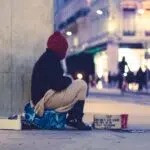National Homeless Persons’ Remembrance Day is commemorated each year on December 21, the winter solstice in the Northern Hemisphere and the longest night of the year. Since the holiday began in 1990, the National Coalition for the Homeless and the National Health Care for the Homeless Council have sponsored this day to call attention to the plight of the country’s homeless population. It’s also a day to encourage the public to act on their behalf.
History of National Homeless Persons’ Remembrance Day
Homelessness in the U.S. started many years ago. During King Philip’s War against the native people, which began in 1675, many colonies were driven out of their homes. Families became refugees across the frontier areas like New York and New England.
It became a national issue in the 1870s and sparked the creation of rescue missions, such as America’s first rescue mission, the New York City Rescue Mission, which Jerry and Maria McAuley founded in 1872. As the government didn’t provide enough assistance, more private charities and organizations tried their best to help. In New York City’s Bowery neighborhood, many rescue missions started appearing. In 1879, The Bowery Mission was founded by Rev. and Mrs. A.G. Ruliffson. The Western Soup Society began in Philadelphia to provide food for the homeless.
In the years that followed, significant events like The Great Depression and World War II greatly increased the number of homeless people in the U.S. Many passed homelessness to the next generation through poverty and crime. In the 1980s, the government started acknowledging that it was becoming a national problem. The Homeless Survival Act was enacted in 1986, providing emergency relief and long-term solutions to homelessness. The Homeless Eligibility Clarification Act ended the problems associated with a permanent address and other social barriers, leading to the introduction of food stamps benefits, Medicaid, and other benefits.
National Homeless Persons’ Remembrance Day timeline
More than one million people are homeless, which prompts federal officials to make low-interest loans to local governments for housing construction.
World War II results in a flurry of mass construction and more direct federal intervention to help house returning war veterans and public housing complexes for private companies manufacturing military supplies.
States and cities begin to clear slums and build highways, which results in more economic segregation.
The Federal Emergency Management Agency and congress create this program which pays local providers to give low-income citizens emergency food, shelter, and financial help, such as paying utility bills.
National Homeless Persons’ Remembrance Day FAQs
What U.S. state has the biggest population of homeless people?
With around 151,278 homeless individuals, the state of California ranks the highest. This accounts for about one-fifth of the total homeless population in the U.S. The lack of affordable housing, inaccessibility of mental health resources, and drug laws contribute to this high number.
What are the three types of homelessness?
The most common type of homelessness is Transitional Homelessness, wherein a person is homeless for a short period due to a crisis. Chronic Homelessness is when someone has been homeless for more than a year or has had frequent episodes of homelessness within the last two years. Episodic Homelessness happens when a person has been homeless three times or more within the last year or when someone has on-and-off periods of homelessness in their life.
What is the homeless rate in America in 2022?
Individuals make up 66.7% of the total homeless population, while families make up the remaining 33.3%. Homelessness has increased nationally by almost 1% in recent years.
How to Observe National Homeless Persons’ Remembrance Day
Arrange a ceremony
Ask your local community for the number of homeless people who died in the previous year. Put together a tribute to remember them, like a candlelight march, a religious service, or perhaps a simple performance. Ideally, these should be performed outdoors to share a little of the experience of the homeless population.
Volunteer at a homeless shelter
Lend a hand by serving meals, helping with kids, and organizing donation drives. Local shelters serve many families and individuals, so no matter what skills you have, they can find something for you to do.
Donate to a homeless charity
Homeless organizations usually operate under strict budgets or depend on donations. Your financial gift may go a long way in helping provide for the needs of homeless individuals.
5 Causes Of Homelessness
Abuse
Men and women who are domestic, physical, or substance abuse survivors are also often victims of homelessness.
Illness and disability
Chronic sickness and disability can prevent one from holding a job, and no work means there’s no money to pay for necessities.
Unemployment
Sudden loss of income can result from illness or unforeseen events in life that prevent someone from earning a living.
Lack of trustworthy relationships
Having people you can trust around you can spell the difference between having somewhere to stay temporarily until you get back on your feet versus finding yourself on the streets.
Lack of affordable housing
Low-income earners may have difficulty paying rent, especially in places where the government increases housing costs to improve quality.
Why National Homeless Persons’ Remembrance Day is Important
It reminds us to take care of each other
Homelessness may be an abstract concept to many, especially those who live in affluent areas. This holiday highlights that we are all connected and responsible for each other.
It builds empathy
It’s not enough that we learn about the plight of the homeless in our community. When we imagine ourselves in their shoes, finding concrete ways to help them becomes easier.
It remembers those who are forgotten
Many homeless people die anonymously in the streets. By recalling who they are, this day gives them the respect they didn’t earn upon their death.
National Homeless Persons’ Remembrance Day dates
| Year | Date | Day |
|---|---|---|
| 2025 | December 21 | Sunday |
| 2026 | December 21 | Monday |
| 2027 | December 21 | Tuesday |
| 2028 | December 21 | Thursday |
| 2029 | December 21 | Friday |





















